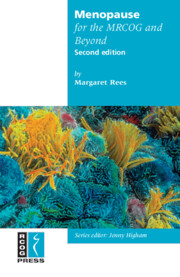Book contents
- Frontmatter
- Contents
- Preface
- Abbreviations
- 1 Definitions and controversies
- 2 Explaining risk
- 3 Systemic hormone replacement therapy
- 4 Non-HRT options for osteoporosis
- 5 Diet and lifestyle
- 6 Alternative and complementary therapies
- 7 Vasomotor symptoms, urogenital and sexual problems
- 8 Osteoporosis and autoimmune arthritis
- 9 Breast disease
- 10 Benign and malignant gynaecological disease
- 11 Premature menopause
- 12 Women with concomitant medical conditions
- Index
11 - Premature menopause
Published online by Cambridge University Press: 05 July 2014
- Frontmatter
- Contents
- Preface
- Abbreviations
- 1 Definitions and controversies
- 2 Explaining risk
- 3 Systemic hormone replacement therapy
- 4 Non-HRT options for osteoporosis
- 5 Diet and lifestyle
- 6 Alternative and complementary therapies
- 7 Vasomotor symptoms, urogenital and sexual problems
- 8 Osteoporosis and autoimmune arthritis
- 9 Breast disease
- 10 Benign and malignant gynaecological disease
- 11 Premature menopause
- 12 Women with concomitant medical conditions
- Index
Summary
The terms ‘premature menopause’ or ‘premature ovarian failure’ describe a stop in the normal functioning of the ovaries in a woman younger than age 40 years. The condition is common. Overall, premature ovarian failure is responsible for 4—18% of cases of secondary amenorrhoea and 10—28% of primary amenorrhoea. It is estimated to affect 1% of women younger than 40 years and 0.1% of those under 30 years. It is important to note that, unless the woman has undergone bilateral oophorectomy, menstruation can recommence and spontaneous pregnancy may still occur.
Symptoms and health consequences of premature ovarian failure
The most common first symptom of premature ovarian failure is irregular periods. Others may present through infertility services. Some women with premature ovarian failure also have other symptoms, similar to those of women with ovarian failure in their 50s. These may include:
• hot flushes and night sweats
• irritability, poor concentration
• decreased libido and dyspareunia
• vaginal dryness.
Mean life expectancy in women with menopause before the age of 40 years is 2.0 years shorter than that in women with menopause after the age of 55 years. Women with untreated premature menopause are at increased risk of developing osteoporosis, cardiovascular disease, dementia, cognitive decline and parkinsonism but at lower risk of breast malignancy. Premature menopause can lead to reduced peak bone mass (if the woman is younger than 25 years) or early bone loss thereafter. The increased risk of coronary heart disease has been noted especially in smokers.
- Type
- Chapter
- Information
- Menopause for the MRCOG and Beyond , pp. 91 - 98Publisher: Cambridge University PressPrint publication year: 2008

